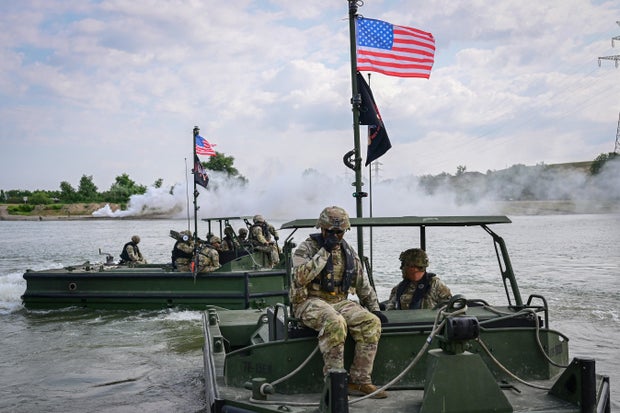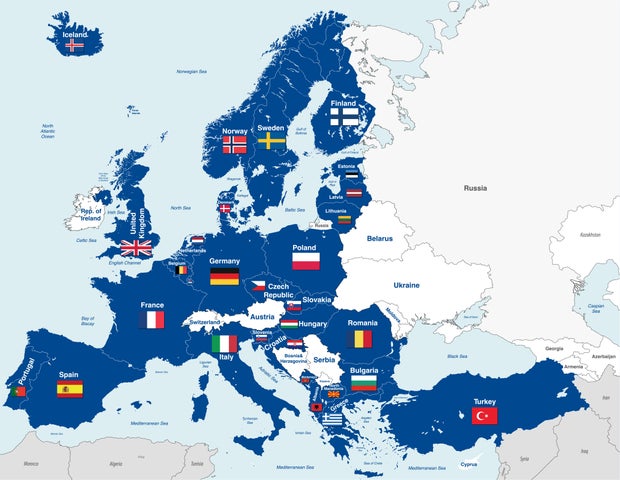NATO and a few of America’s allies within the transatlantic alliance have sought to ease considerations over the Trump administration’s transfer to cut back the U.S. army’s presence in Europe amid Russia’s ongoing assault on Ukraine and because it’s accused of ramping up hybrid warfare in opposition to NATO nations.
The Pentagon introduced Thursday that it was decreasing the variety of U.S. troops deployed in japanese Europe. U.S. officers informed CBS Information that round 700 U.S. airborne troops who’ve been deployed in Germany, Romania and Poland would come home and not be replaced.
In an announcement, the U.S. Military Europe and Africa stated it was a part of Secretary of Protection Pete Hegseth’s “deliberate course of to make sure a balanced U.S. army pressure posture,” and “not an American withdrawal from Europe or a sign of lessened dedication to NATO and Article 5. Relatively this can be a constructive signal of elevated European functionality and duty.”
DANIEL MIHAILESCU/AFP/Getty
“Our NATO allies are assembly President Trump’s name to take main duty for the traditional protection of Europe,” the Military stated. “This pressure posture adjustment is not going to change the safety atmosphere in Europe.”
NATO and allies stress “U.S.’s continued dedication” to Europe
On Thursday, showing eager to ease such considerations, Estonian Minister of Protection Hanno Pevkur stated in an announcement that the U.S. had “made a major resolution to take care of its army presence in Estonia, reaffirming the U.S.’s continued dedication to the protection of the area and NATO’s entire eastern flank.”
“We’re working to additional strengthen the U.S. army presence in our area,” he added.
In September, Estonia stated Russian army jets had violated the nation’s airspace for 12 minutes, simply days after Poland stated greater than 20 Russian drones entered its airspace. This week, Lithuania closed its border with Russia’s shut ally Belarus, after accusing each international locations of a “deliberate escalation of hybrid warfare.”
NATO says deterrence measures alongside its japanese flank have been “massively reinforced” over the past decade “as a direct results of Russia’s conduct.” That boundary runs from the Arctic Sea within the north to the Black Sea within the south.
brichuas/Getty
The reinforcements embody U.S. troops, however the Trump administration has pushed its European NATO allies onerous to take extra duty — and bear extra of the monetary burden — for their very own safety, asserting earlier this 12 months that it will make the Indo-Pacific a main international coverage focus, moderately than Europe, regardless of the continued warfare in Ukraine.
“The choice was anticipated,” Romania’s Ministry of Protection stated in a statement Wednesday, referring to the announcement of the U.S. troop discount.
U.S. Ambassador to NATO Matthew Whitaker said in a social media put up that America’s partnership with Romania “stays stronger than ever,” and reiterated the Pentagon’s message that it was in response to European forces’ elevated capacities.
The reassurances haven’t quelled debate about whether or not the transfer could possibly be only the start of a wider U.S. withdrawal from Europe. The Ukrainian newspaper Kyiv Post reported Friday that additional American troop reductions are anticipated, with troops to be pulled from Bulgaria, Slovakia and Hungary by the tip of the 12 months.
There was no instant public response to the report from the Pentagon or the Trump administration.
NATO has additionally sought to ease considerations, with a senior army official from the alliance telling CBS Information on Thursday that, “even with this adjustment, the U.S. pressure posture in Europe stays bigger than it has been for a few years.”
“U.S. dedication to NATO is obvious,” the official stated. “President Trump and his administration have reiterated this repeatedly. NATO has strong protection plans in place and we’re working to make sure we preserve the best forces and capabilities in place to discourage and defend one another.”
Concern in Washington, from either side of the aisle
The announcement drew bipartisan criticism in Washington, with some senior lawmakers warning it may embolden Russia and undermine the NATO alliance.
In a joint statement issued Thursday by the U.S. Home Armed Companies Committee, the chairmen of that committee and the corresponding Senate physique — each Republicans — stated they strongly opposed the change within the U.S. deployment in Romania, which they stated “seems uncoordinated and instantly at odds with the President’s technique.”
Senator Roger Wicker and Consultant Mike Rogers, within the assertion, additionally indicated that they believed the Pentagon may make additional reductions to the U.S. deployment in Europe.
“We strongly oppose the choice to not preserve the rotational U.S. brigade in Romania and the Pentagon’s course of for its ongoing pressure posture assessment that will end in additional drawdowns of U.S. forces from Jap Europe,” stated the Republican lawmakers.
“On March 19, we stated that we’ll not settle for important modifications to our warfighting construction which are made with no rigorous interagency course of, coordination with combatant commanders and the Joint Workers, and collaboration with Congress,” stated Wicker and Rogers. “Sadly, this seems to be precisely what’s being tried.”
On Thursday, Rep. Mike Turner, additionally a Republican and the pinnacle of the U.S. delegation to the NATO Parliamentary Meeting, stated he was “involved by reviews of reductions of US forces in Romania.”
“Congress has been clear that US pressure posture throughout Europe should stay strong and resolute. Russia’s aggressive actions in opposition to Jap Flank international locations via intentional airspace incursions underscores Russia’s ambition past Ukraine,” stated Turner. “It’s in our nationwide safety pursuits to assist our NATO Allies as they rightly ramp up their investments of their protection capabilities.”
Democratic Sen. Jeanne Shaheen, rating member of the Senate International Relations Committee, called the decision to cut back the U.S. presence within the area “deeply misguided” in an announcement launched Thursday.
“This resolution sends precisely the unsuitable sign to Vladimir Putin as he continues his murderous marketing campaign in Ukraine and exams NATO resolve via provocations in opposition to different frontline states,” she stated.
This is premium stuff. Subscribe to read the entire article.
Support Greater and Subscribe to view content
















